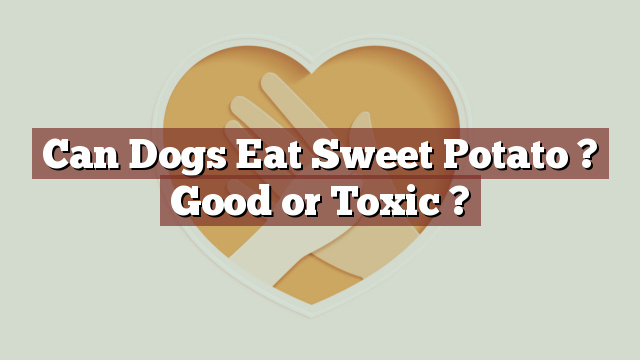Can Dogs Eat Sweet Potato? Good or Toxic?
Knowing which foods are safe for your dog to eat is essential for their overall health and well-being. One common food that many dog owners wonder about is sweet potato. So, can dogs eat sweet potato? Let’s take a closer look at the nutritional value, potential risks, and benefits of dogs eating sweet potato.
Nutritional Value of Sweet Potato: Vitamins, Fiber, and More
Sweet potatoes are rich in essential vitamins and minerals, making them a nutritious choice for both humans and dogs. They are an excellent source of vitamin A, which promotes healthy vision and a strong immune system. Additionally, sweet potatoes contain significant amounts of vitamin C, vitamin B6, and potassium.
In terms of dietary fiber, sweet potatoes are a great option. They can help regulate a dog’s digestive system and prevent constipation. The fiber content in sweet potatoes also aids in weight management and can contribute to a healthy heart.
Are Sweet Potatoes Safe for Dogs? Learn the Facts.
Yes, sweet potatoes are generally safe for dogs to eat in moderate amounts. They can be a healthy addition to your dog’s diet when prepared properly. However, it is important to note that dogs have different digestive systems than humans, so certain precautions should be taken.
Raw sweet potatoes should never be given to dogs as they can be difficult to digest and may cause digestive upset. It is crucial to cook sweet potatoes thoroughly before serving them to your furry friend. Additionally, avoid adding any seasonings, oils, or toppings that may be harmful to dogs, such as garlic or onions.
Potential Risks and Benefits of Dogs Eating Sweet Potato
While sweet potatoes are safe for dogs, there are a few potential risks to be aware of. Like any food, overfeeding sweet potatoes can lead to weight gain and obesity in dogs. It is essential to incorporate sweet potatoes into their diet in moderation and as part of a balanced meal plan.
On the other hand, there are several benefits to dogs eating sweet potato. The high fiber content can aid digestion and promote a healthy gastrointestinal tract. The vitamins and minerals in sweet potatoes contribute to overall immune function and help maintain a shiny coat and healthy skin.
My Dog Ate Sweet Potato, What Should I Do Now?
If your dog has consumed a moderate amount of cooked sweet potato, there is usually no cause for concern. However, if they have eaten a large quantity or show any signs of discomfort, it is best to contact your veterinarian for guidance. They can assess the situation and provide appropriate advice based on your dog’s specific needs.
Conclusion: Sweet Potato Can Be a Healthy Treat for Dogs
In conclusion, dogs can eat sweet potato as long as it is cooked thoroughly and given in moderation. Sweet potatoes offer various nutritional benefits, including vitamins, fiber, and minerals. They can be a healthy addition to your dog’s diet, promoting digestive health and overall well-being. However, it is crucial to avoid feeding your dog raw sweet potatoes or adding any harmful seasonings. If you have any concerns or questions, consulting your veterinarian is always the best course of action.
Thank you for investing your time in exploring [page_title] on Can-Eat.org. Our goal is to provide readers like you with thorough and reliable information about various dietary topics. Each article, including [page_title], stems from diligent research and a passion for understanding the nuances of our food choices. We believe that knowledge is a vital step towards making informed and healthy decisions. However, while "[page_title]" sheds light on its specific topic, it's crucial to remember that everyone's body reacts differently to foods and dietary changes. What might be beneficial for one person could have different effects on another. Before you consider integrating suggestions or insights from "[page_title]" into your diet, it's always wise to consult with a nutritionist or healthcare professional. Their specialized knowledge ensures that you're making choices best suited to your individual health needs. As you navigate [page_title], be mindful of potential allergies, intolerances, or unique dietary requirements you may have. No singular article can capture the vast diversity of human health, and individualized guidance is invaluable. The content provided in [page_title] serves as a general guide. It is not, by any means, a substitute for personalized medical or nutritional advice. Your health should always be the top priority, and professional guidance is the best path forward. In your journey towards a balanced and nutritious lifestyle, we hope that [page_title] serves as a helpful stepping stone. Remember, informed decisions lead to healthier outcomes. Thank you for trusting Can-Eat.org. Continue exploring, learning, and prioritizing your health. Cheers to a well-informed and healthier future!

